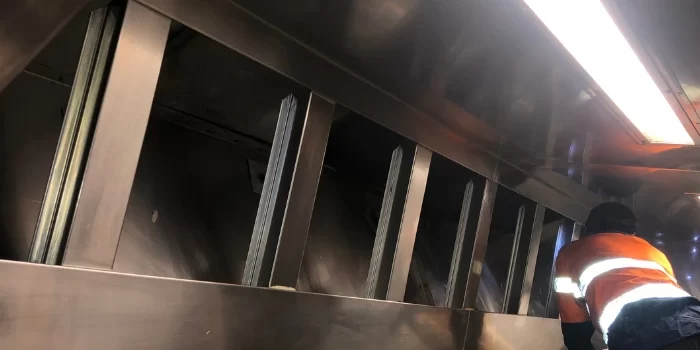Keeping a kitchen clean can be challenging, especially when dealing with the oil buildup on counters, cabinets, and backsplashes. While washing dishes, pans, and utensils is a must, the grease that accumulates on surfaces can present the most extensive cleaning challenge. Unfortunately, water alone cannot remove grease because water molecules do not adhere to grease molecules. Moreover, using elbow grease may not always suffice for stubborn grime. Thankfully, commercial grease cleaners and effective cleaning techniques can help tackle this problem efficiently. In this guide, we will explore various methods for getting rid of kitchen grease and maintaining a clean kitchen.
Regular Maintenance
Regular maintenance is the secret to a grease-free kitchen. Establishing a routine for cleaning kitchen equipment, surfaces, and exhaust systems is essential. Make it a habit to wipe down surfaces, stoves, and cabinet doors after each cooking session. By being proactive, you can significantly reduce grease buildup. For comprehensive care, consider hiring a reputable canopy cleaning service in Melbourne to handle your kitchen’s maintenance. This ensures that your exhaust system and equipment remain in optimal condition.
Vinegar and Water Solution
A practical and eco-friendly solution for cleaning grease is a mixture of water and white vinegar. Combine equal parts of both in a spray bottle. This age-old method is highly effective for tackling grime and grease. Spray the mixture onto oily surfaces, including kitchen appliances, counters, and stove hoods. Let it sit for a few minutes to dissolve the grease, then wipe it clean with a cloth or sponge. Rinse as necessary. For more thorough cleaning, consider hiring professional canopy cleaning services, which utilise specialised tools and products to achieve optimal results.
Dispose of Food Waste Properly
An excellent way to reduce grease buildup is to dispose of food waste properly. Instead of rinsing food waste down the sink or garbage disposal, which can lead to clogs, use a solid waste container. Scrape leftovers into the trash or compost bin and wipe down plates and pans to remove any residual food particles or grease before washing. This practice not only keeps your kitchen cleaner but also helps prevent plumbing issues caused by grease and food waste buildup.
Use a Splatter Screen or Lid
Using a splatter screen or lid while cooking is another effective strategy for minimizing grease buildup in your kitchen. These tools help contain grease and oil splatters, preventing them from landing on your stove, countertops, and walls. Additionally, lids can help retain steam, allowing food to cook more evenly and quickly. Implementing this simple practice can make cooking more accessible while keeping your kitchen cleaner. For stubborn grease removal, consider hiring expert services for canopy range hood cleaning.
Regular Cleaning to Prevent Buildup
Regular cleaning is crucial to avoid grease accumulation. Make it a point to clean your kitchen surfaces after every meal. This includes wiping down the stove and countertops and cleaning up any spills immediately. Frequent mopping and vacuuming of floors will also help prevent grease from accumulating in those areas. By adopting these habits, you can avoid the need for extensive cleaning sessions later.
Rubbing Alcohol and Salt
For stricter grease stains, try a mixture of rubbing alcohol and salt. Combine one part of rubbing alcohol with four parts of salt, then scrub the mixture over the stained area until the grease lifts away. Once you’ve removed the grease, vacuum up any excess salt and use a damp cloth to wipe away any remaining residue.
Avoid Cleaning Sinks and Drains with Grease
One of the worst practices you can adopt in the kitchen is pouring grease down the sink or drain. Grease can solidify and clog pipes, leading to costly plumbing repairs. Instead, pour the grease into a container, let it cool, and then dispose of it properly. You can also use absorbent materials like coffee grounds or cat litter to soak up any excess grease before throwing it away.
Final Thoughts
In conclusion, maintaining a clean kitchen requires good cooking practices, the right tools, and routine cleaning to prevent grease buildup. By implementing these cleaning strategies, you can enjoy a sparkling kitchen that is safe and healthy for cooking. Additionally, if the task becomes overwhelming, don’t hesitate to contact a professional canopy cleaner for help. They can provide expert services, including:
- Canopy Range Hood Cleaning
- Canopy Duct Cleaning
- Kitchen Exhaust Fan Cleaning
- Kitchen Equipment Cleaning
- Canopy Filter Cleaning
With the right approach and regular upkeep, you can maintain a clean kitchen that not only looks great but also functions safely and efficiently.

